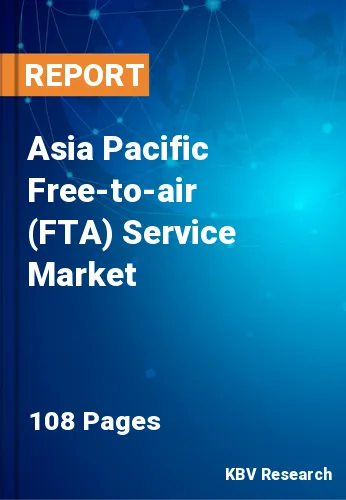The Asia Pacific Free-to-air (FTA) Service Market would witness market growth of 11.1% CAGR during the forecast period (2023-2030).
Free-to-air services have changed over time and integrated various digital features to maintain their competitiveness in the market and satisfy viewers' shifting expectations. The relevance of free-to-air services in digital broadcasting technologies, such as High-Definition (HD) and Ultra High-Definition (UHD) content, Video-On-Demand (VOD), and satellite tuners, is expanding, owing to its advantages like efficient content delivery and immersive watching experience. To ensure that consumers receive all free-to-air channels run by the state broadcasters (Doordarshan) without the need to install a set-up box, the Bureau of Indian Standards (BIS) finalized a standard for digital television receivers with built-in satellite tuners in 2022. These significant advancements in digital broadcasting are projected to improve the market's prospects for future growth.
To build the infrastructure for public service broadcasters Prasar Bharati - All India Radio (AIR) and Door Darshan (DD), India's Ministry of Information and Broadcasting began investing in the Broadcasting Infrastructure and Network Development (BIND) Scheme in January 2023. The BIND Scheme will have an estimated funding of Rs. 2539.61 crore up to 2025-2026. The financing is anticipated to provide Prasar Bharati with financial assistance for costs associated with its broadcasting infrastructure's extension and improvement, organizational-related civil work, and content development. As a result, free-to-air services gained more popularity among end consumers, fueling market expansion.
Introducing subscription-based models is one of the significant developments in Japan's OTT video sector. Instead of buying individual movies or TV series, many consumers prefer the ease of paying a monthly price for unrestricted access to a vast library of content. Because of this, subscription-based services like Netflix and Amazon Prime Video have been successful in Japan. Another trend is the creation of regional OTT video platforms that target Japanese audiences mainly and provide a mix of local and foreign content. Underlying macroeconomic conditions have also impacted the OTT Video sector in Japan. Japan's consumer base is developed and wealthy, with high disposable money and a great need for amusement. With a considerable percentage of the population owning smartphones, the nation boasts a high smartphone penetration rate. These factors pose lucrative prospects for the free-to-air services in the region.
The China market dominated the Asia Pacific Free-to-air (FTA) Service Market, by Country in 2022, and would continue to be a dominant market till 2030; thereby, achieving a market value of $20,267.3 Million by 2030. The Japan market is experiencing a CAGR of 10.4% during (2023 - 2030). Additionally, The India market would exhibit a CAGR of 11.8% during (2023 - 2030).
Based on Application, the market is segmented into Residential, and Commercial. Based on Device Type, the market is segmented into Cable Television, Satellite Television, Mobile TV, and Radio. Based on countries, the market is segmented into China, Japan, India, South Korea, Singapore, Malaysia, and Rest of Asia Pacific.
Free Valuable Insights: The Worldwide Free-to-air (FTA) Service Market is Projected to reach USD 258.3 Billion by 2030, at a CAGR of 10.4%
The market research report covers the analysis of key stake holders of the market. Key companies profiled in the report include Eutelsat S.A., AMC Networks, Inc., BT Group plc, RTL Group S.A. (SpotX, Inc.), Deutsche Telekom AG, Comcast Corporation (Sky plc), ITV plc, Sony Corporation and DEN Networks Ltd.
By Application
By Device Type
By Country
Our team of dedicated experts can provide you with attractive expansion opportunities for your business.

